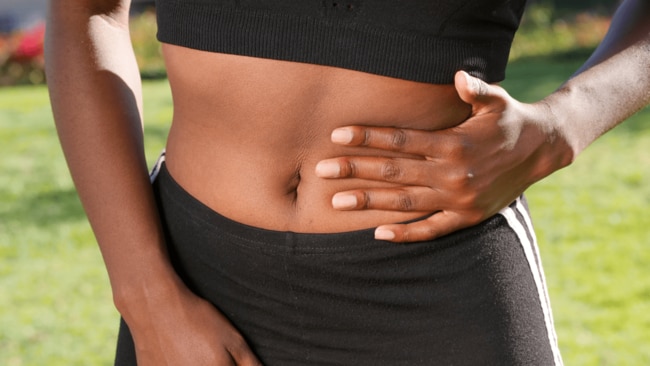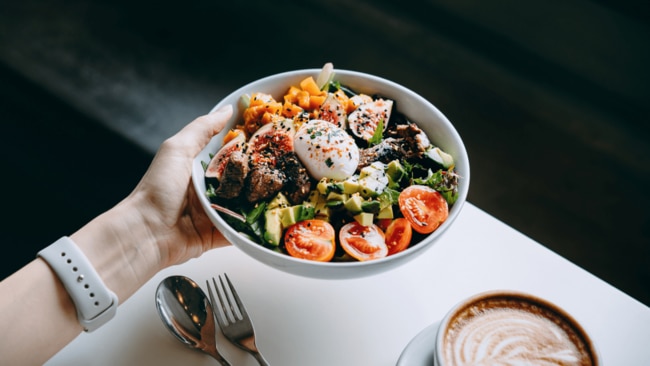This diet could fix hot flushes, for good
Are hot flushes keeping you up at night? The solution is on your plate
Menopause
Don't miss out on the headlines from Menopause. Followed categories will be added to My News.
The Big Change affects everyone differently, but given 80 per cent of menopausal women say living with the symptoms is a punish, turns out what’s on your plate could be one of the most powerful solutions.
When Julia first sought out the help of nutritional therapist Joanna Lyall, she was – to sum things up – in a bit of a funk. Fifty-one, perimenopausal, anxious and practically waging war with her pillow every (sleepless) night. As a mum of two, juggling the demands of a senior HR role, she felt like she was barely keeping her head above water.
Like so many women, she’d tried hormone replacement therapy (HRT) and herbal supplements, but her continuing lack of sleep meant she felt increasingly too stressed to cope.
In the end, it was a stool sample test (yes, you read that right) that transformed the busy mum’s life. How it finally solved her wellness puzzle? Lyall used it to look into Julia’s gut biology and hormone levels which encouraged her to prescribe a full diet makeover: goodbye alcohol and processed foods and hello to more greens, nuts and oily fish.
Plus, a sprinkle of sleep-enhancing tryptophan, which can be found in chicken, turkey and bananas to put an end to those restless nights. She also recommended Julia start taking a probiotic.
Fast forward a couple of months and Julia’s experienced a major health glow-up. “As a result of the dietary changes, Julia’s mood improved and she’s now sleeping well for the first time in five years,” Lyall confirmed.
Menopause affects every woman, but research shows only 15 per cent in this life phase are taking HRT. This could be pinned down to a lack of access, or a fear of side effects or long-term consequences – but as a result, many females, whether on HRT or not, experience some sort of health issue in midlife as a result.
According to UK-based advocacy organisation, Menopause Support, eight in 10 women find at least one menopause symptom “very difficult” to live with, with problems ranging from general brain fog to sleep issues and anxiety. Worryingly, women’s rights charity The Fawcett Society claims one in 10 women in the UK have left the workforce because of their symptoms. Perhaps unsurprisingly, the role of the gut as a solution is often overlooked – but, say experts, it’s time that changed.

There’s a growing field of science now focused on the link between our microbiome – the “friendly” bacteria that live inside our gut – and better mental health. A 2020 review of studies found a correlation between probiotic bacteria and sleep quality, as well as mood improvement in people who experienced anxiety and depression. For Julia, this fascinating link proved to be the key to resolving her menopause-related symptoms.
Now that menopause is finally getting some air time, both in research and the mainstream media, experts are finding that our gut health could be the non-medical solution to debilitating symptoms. Better yet, this approach can work in tandem with hormone replacement therapy to maximise potential comfort. In some cases, HRT has even been shown to positively affect gut health as lower oestrogen levels during the menopause reduces the diversity of the microbiome, and topping those levels up reverses that effect.
So what does this all mean if you’re fanning away hot flashes right now? And how can you find some quick - but long-lasting - relief? Read on for our expert advice.

First of all, oestrogen matters – a lot
“The drop in oestrogen during both perimenopause and menopause, and the reduction in diversity in the gut microbiome, affects the way the gut enzyme functions,” says GP and menopause specialist Dr Shahzadi Harper. “This can exacerbate some of our menopause symptoms like low mood and anxiety, while increasing those tired, sluggish feelings.”
Sex hormones, particularly oestrogen, have a powerful influence on the way your gut and brain communicate as well – this is known as the gut-brain axis. “We know that when we’re mentally stressed, our gut feels it too,” explains clinical nutritionist and author of new book The Gut Repair Plan, Sarah Di Lorenzo. “Which is why it’s very common for women to suffer from IBS during menopause.” So how do we prevent this?

It’s all about rebalancing your gut
Understanding this process starts with understanding the role of gut bacteria called estrobolome. “Estrobolome is made up of the microbes in the gut that interact with oestrogen,” says Di Lorenzo. When out of whack, things like your libido, sleep and energy levels can take a serious hit.
“The way it works is by ensuring our oestrogen is active,” explains Di Lorenzo. “Our gut microbiome (the ecosystem that lives in our gut) is responsible for mood, metabolism, immunity and weight. Women who have gone through menopause have a very similar microbiome as a male because their oestrogen has dropped right down thanks to the natural oestrogen process which deactivates this hormone.”
While there’s no silver bullet, there are ways to improve your gut health with a few lifestyle changes. “If you’re eating a healthy diet of fibre, you can actually reactivate oestrogen and reverse these symptoms,” assures Di Lorenzo. “Minimising your sugar and alcohol intake while drinking enough water will support the microbes in your gut to encourage reactivation of your oestrogen, too.”
Feed good bacteria what they need
Foods that encourage the growth of healthy gut bacteria – prebiotics – include wholegrains and green leafy veg, bananas and almonds. Probiotics – the live bacteria and yeasts that are good for you – can also be taken as supplements and found in some foods, like live yoghurt.
“Some prebiotics and probiotics produce chemical messengers called neurotransmitters, which help reduce anxiety and improve the way you deal with stress,” says Crowther. These include GABA, which has a relaxing effect, as well as serotonin and the ‘feel-good’ hormone dopamine, which can be particularly helpful when navigating the ups and downs of menopausal hormonal mood swings.

The delicious menopause diet
Real talk: Some women find the hormonal changes of menopause significantly affect their digestion, causing more uncomfortable symptoms like bloating and excessive gas.
“When you start losing oestrogen, which is a telltale sign of menopause, the transit time - from when you get food to when it exits the body - slows down and can lead to constipation, which is never ideal,” explains Di Lorenzo. “A slow transit time means the food we eat sits in our gut longer than usual where it ferments and causes very common IBS symptoms like gas, diarrhoea and constipation.”
The key to stopping this from happening actually lies in the food we eat. “Things like drinking coffee because you're tired, snacking on chocolate and other sugary things to beat the afternoon slump, and guzzling a glass of wine or three to wash away the day, all of these things - sugar, alcohol, excess caffeine - irritate the gut,” says Di Lorenzo.
“All the healthy living advice we hear every day like making sure we’re sleeping well, eating a good diet, doing regular exercise, managing your anxiety, minimising your alcohol intake, and drinking enough water, actually help. This is how you will support all of the microbes in your gut which will in turn reactivate your oestrogen and counter the common symptoms of menopause.”
“At the end of the day, a good gut equals a good menopause.” Now that’s a deliciously simple prescription we can get behind.
More Coverage
Originally published as This diet could fix hot flushes, for good




